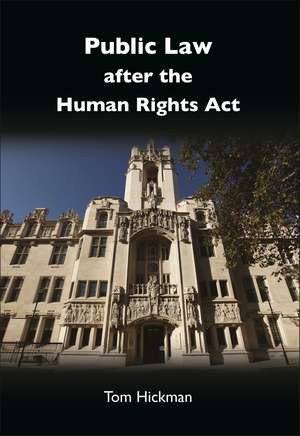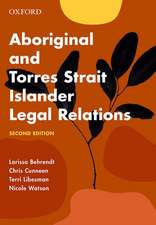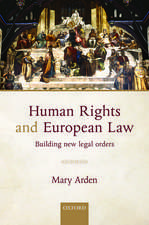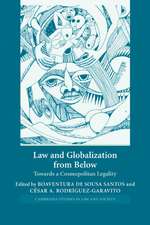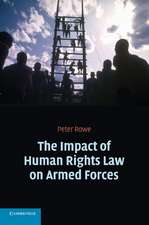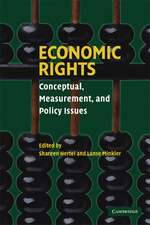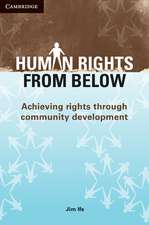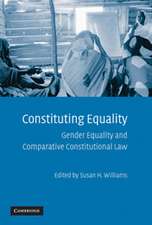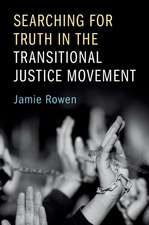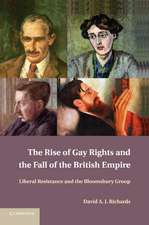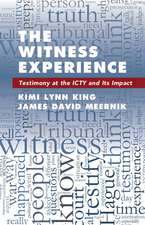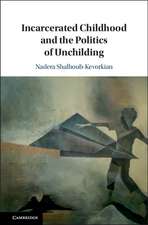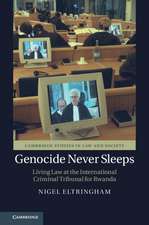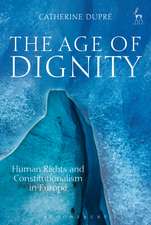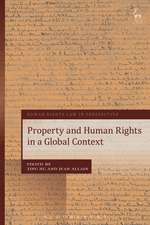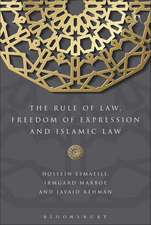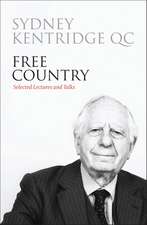Public Law after the Human Rights Act
Autor Tom Hickmanen Limba Engleză Paperback – 19 mai 2010
Preț: 348.71 lei
Preț vechi: 477.94 lei
-27% Nou
Puncte Express: 523
Preț estimativ în valută:
66.72€ • 69.67$ • 55.10£
66.72€ • 69.67$ • 55.10£
Carte tipărită la comandă
Livrare economică 15-29 aprilie
Preluare comenzi: 021 569.72.76
Specificații
ISBN-13: 9781841139692
ISBN-10: 1841139696
Pagini: 360
Dimensiuni: 156 x 234 x 18 mm
Greutate: 0.61 kg
Editura: Bloomsbury Publishing
Colecția Hart Publishing
Locul publicării:London, United Kingdom
ISBN-10: 1841139696
Pagini: 360
Dimensiuni: 156 x 234 x 18 mm
Greutate: 0.61 kg
Editura: Bloomsbury Publishing
Colecția Hart Publishing
Locul publicării:London, United Kingdom
Notă biografică
Tom Hickman is a Barrister at Blackstone Chambers, London, specialising in public law and human rights cases.
Cuprins
AcknowledgementsIntroduction 1. The HRA and the Common law 2. Constitutional Theories and Constitutional Dialogue 3. Public law standards 4. Weight and deference 5. Proportionality 6. Reasonableness7. Process review 8. The Structure of Public Law after the Human Rights Act9. Emergencies, derogation and detention 10. The right to a court
Recenzii
This book proposes answers to questions about the relationship between the Human Rights Act, human rights principles and the common law.
Hickman...brings practical understanding to bear on his thoroughly researched, lucid, elegant, and sometimes witty analysis of the relevant academic literature and English and selected European cases, and of the brief but useful Australian ... Canadian and New Zealand examples he employs....an illuminating, clear and engaging work based on extensive research [which] will be of particular benefit to English legislators, policy-makers, judges, academics and lawyers, as they work in the shifting (and sometimes colliding) territories of the common law, constitutionalism and human rights.
Hickman's book ... poses questions of importance, seeks to answer them, and analyses critically a number of the leading cases that have arisen since the 1998 Act came into effect.Hickman's text is a valuable addition to the rich vein of scholarship about the impact of the 1998 Act
Tom Hickman has produced a thoughtful and provoking book which successfully blends practical insight with theoretical and doctrinal ... analysis. There is much in this book to engage with, to reflect on and - importantly - to enjoy.
[the] distinctive emphases repay close reading ... as [does] the originality, nuance and rigour of [the] arguments.[the book] will be of interest to practitioners and scholars alike, as [it] artfully blend[s] constitutional theory with critical discussion of the cases.
'.a welcome and important addition to this literature.The inquiry is pursued vigorously through close analysis of case law and the academic literature. Tom has not been afraid to challenge those of all persuasions. Judicial decisions are criticized where it is felt that the courts have not reached the best result in relation to a central issue under the HRA. So too academics, when Tom believes that their approach to a particular doctrinal or conceptual issue is wanting. There will doubtless be those who disagree with Tom's own reasoning. It is a testimony to this valuable book that it will stimulate further debate on the central themes that pervade the Human Rights Act and its impact on public law. The book will be of interest to academics and practitioners alike.'From the foreword by Paul Craig, Professor of English Law, University of Oxford, April 2010 This book will at the very least stimulate further debate on the subject. It seems likely that it will also play an important part in informing it.
The front cover of Public Law after the Human Rights Act is a picture of the new Supreme Court, and the book itself appears to be imbued with much of the spirit of the Court: a desire to make things more clear and transparent, not being afraid to tread a new path but unconvinced by arguments of the need for drastic measures. The author, Tom Hickman, is one of those rare beasts that one tends to find in the Supreme Court, a practitioner genuinely involved in some of the most important and controversial public law cases whilst also being a widely-published academic lawyer with a stellar reputation.Hickman's book deserves to be widely read...every public lawyer will find something to chew over.It is a measure of Hickman's achievement that anyone writing in almost every debated area of HRA-related public law will now have to engage with the arguments made in Public Law after the Human Rights Act. Some of the debates Hickman will win. Some he will (or should) lose. All of them will be enriched by this book and the public lawyers will be thankful that it has been written.
Throughout, Hickman moves deftly between the roles of constitutional scholar and public law practitioner providing a work that will undoubtedly prove thought-provoking and highly useful to both.
Hickman...brings practical understanding to bear on his thoroughly researched, lucid, elegant, and sometimes witty analysis of the relevant academic literature and English and selected European cases, and of the brief but useful Australian ... Canadian and New Zealand examples he employs....an illuminating, clear and engaging work based on extensive research [which] will be of particular benefit to English legislators, policy-makers, judges, academics and lawyers, as they work in the shifting (and sometimes colliding) territories of the common law, constitutionalism and human rights.
Hickman's book ... poses questions of importance, seeks to answer them, and analyses critically a number of the leading cases that have arisen since the 1998 Act came into effect.Hickman's text is a valuable addition to the rich vein of scholarship about the impact of the 1998 Act
Tom Hickman has produced a thoughtful and provoking book which successfully blends practical insight with theoretical and doctrinal ... analysis. There is much in this book to engage with, to reflect on and - importantly - to enjoy.
[the] distinctive emphases repay close reading ... as [does] the originality, nuance and rigour of [the] arguments.[the book] will be of interest to practitioners and scholars alike, as [it] artfully blend[s] constitutional theory with critical discussion of the cases.
'.a welcome and important addition to this literature.The inquiry is pursued vigorously through close analysis of case law and the academic literature. Tom has not been afraid to challenge those of all persuasions. Judicial decisions are criticized where it is felt that the courts have not reached the best result in relation to a central issue under the HRA. So too academics, when Tom believes that their approach to a particular doctrinal or conceptual issue is wanting. There will doubtless be those who disagree with Tom's own reasoning. It is a testimony to this valuable book that it will stimulate further debate on the central themes that pervade the Human Rights Act and its impact on public law. The book will be of interest to academics and practitioners alike.'From the foreword by Paul Craig, Professor of English Law, University of Oxford, April 2010 This book will at the very least stimulate further debate on the subject. It seems likely that it will also play an important part in informing it.
The front cover of Public Law after the Human Rights Act is a picture of the new Supreme Court, and the book itself appears to be imbued with much of the spirit of the Court: a desire to make things more clear and transparent, not being afraid to tread a new path but unconvinced by arguments of the need for drastic measures. The author, Tom Hickman, is one of those rare beasts that one tends to find in the Supreme Court, a practitioner genuinely involved in some of the most important and controversial public law cases whilst also being a widely-published academic lawyer with a stellar reputation.Hickman's book deserves to be widely read...every public lawyer will find something to chew over.It is a measure of Hickman's achievement that anyone writing in almost every debated area of HRA-related public law will now have to engage with the arguments made in Public Law after the Human Rights Act. Some of the debates Hickman will win. Some he will (or should) lose. All of them will be enriched by this book and the public lawyers will be thankful that it has been written.
Throughout, Hickman moves deftly between the roles of constitutional scholar and public law practitioner providing a work that will undoubtedly prove thought-provoking and highly useful to both.
Descriere
This book proposes answers to questions about the relationship between the Human Rights Act, human rights principles and the common law.
